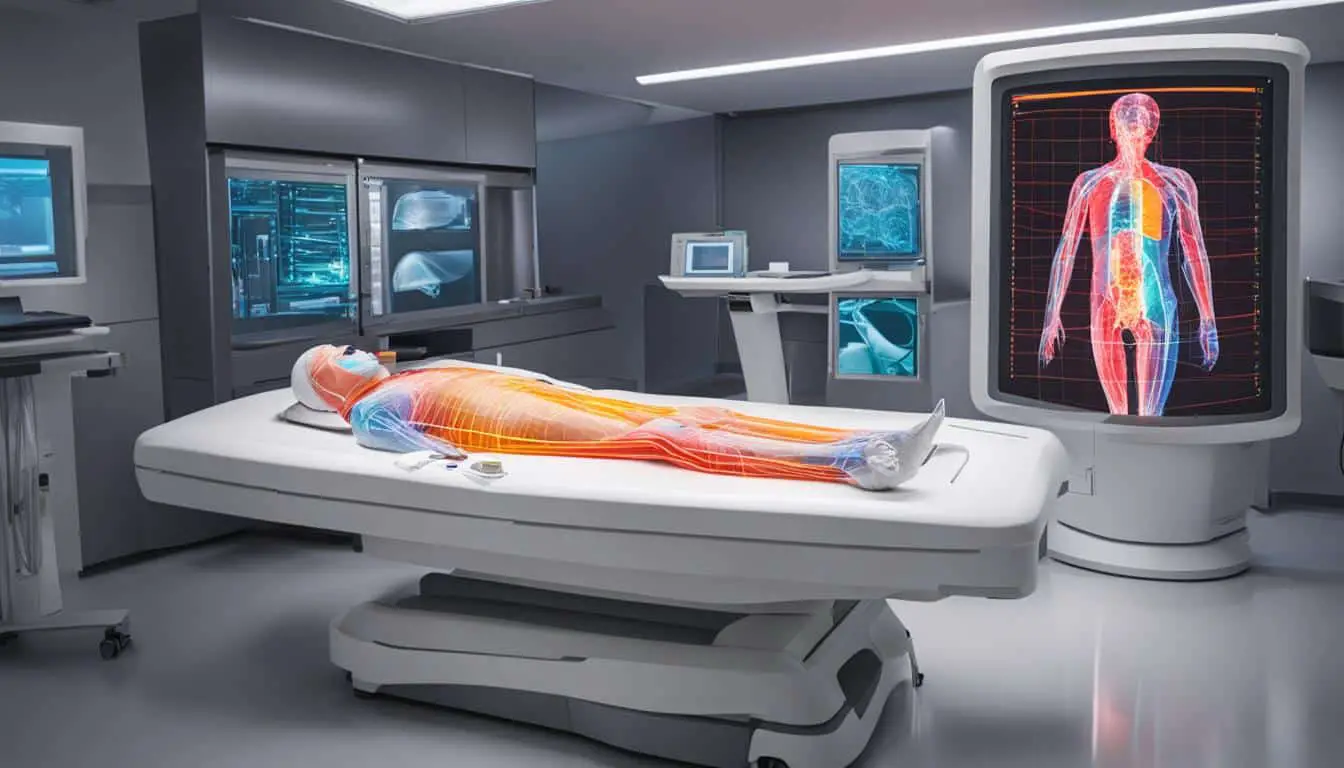
Artificial intelligence (AI) has the potential to revolutionize healthcare by enhancing disease prediction and diagnosis. As a journalist, I have closely observed how AI can transform clinical practice, offering improved accuracy, reduced costs, and better patient outcomes. AI utilizes machine learning algorithms and predictive analytics to identify patterns and surpass human performance in healthcare tasks.
The integration of AI in healthcare settings has already demonstrated promising results in disease diagnosis, including cancer, skin conditions, and diabetic retinopathy. However, responsible implementation requires addressing challenges related to data privacy, bias, and the need for human expertise.
In this article, I will explore the applications of AI in disease diagnosis and treatment, as well as the ethical and legal considerations that arise with its implementation. By the end, you will have a comprehensive understanding of the impact of AI on healthcare and the potential it holds for the future.
Key Takeaways
- AI has the potential to revolutionize healthcare by improving disease prediction and diagnosis.
- Machine learning algorithms and predictive analytics enable AI to surpass human performance in healthcare tasks.
- AI has shown promising results in diagnosing diseases such as cancer, skin conditions, and diabetic retinopathy.
- Challenges related to data privacy, bias, and the need for human expertise must be addressed for responsible implementation of AI in healthcare.
- The integration of AI in healthcare holds great potential for improving patient care and outcomes.
Applications of AI in Disease Diagnosis and Treatment
Artificial intelligence (AI) has made significant advancements in the field of healthcare, particularly in disease diagnosis and treatment. By utilizing predictive analytics and machine learning algorithms, AI has the potential to revolutionize the way diseases are identified and managed. With its ability to analyze large datasets and provide personalized recommendations, AI can assist healthcare professionals in making informed decisions, optimizing treatment plans, and improving patient outcomes.
One of the key applications of AI in disease diagnosis is its ability to analyze medical images and detect abnormalities. Deep learning algorithms and neural networks have proven to be highly effective in diagnosing diseases such as breast cancer and melanoma. These algorithms can analyze images with a level of accuracy that surpasses human capabilities, enabling early detection and timely intervention.
In addition to image analysis, AI can also predict disease progression and treatment outcomes. By analyzing patient data and historical treatment records, machine learning algorithms can identify patterns and make predictions about the effectiveness of certain treatments. This enables healthcare professionals to personalize treatment plans and optimize medication dosages, resulting in improved patient care.
| Disease | AI Application |
|---|---|
| Breast Cancer | AI algorithms can analyze mammogram images to detect signs of breast cancer at an early stage. |
| Melanoma | AI algorithms can analyze skin images to detect malignant skin lesions, aiding in early diagnosis. |
| Diabetic Retinopathy | AI can analyze retinal images to detect signs of diabetic retinopathy, enabling early intervention and preventing vision loss. |
With the advancements in AI technology, the healthcare industry can leverage predictive healthcare technology to improve disease diagnosis and treatment. However, it is important to address ethical and legal considerations surrounding the implementation of AI in healthcare. Ensuring data privacy and security, mitigating bias in algorithms, and maintaining the need for human expertise are crucial aspects that need to be carefully navigated to ensure responsible and effective use of AI in healthcare.
Ethical and Legal Considerations in AI Implementation
The implementation of AI in the healthcare industry brings forth important ethical and legal considerations. As the use of artificial intelligence and predictive analytics becomes more prevalent in healthcare, data privacy and security must be given utmost importance. Protecting sensitive patient information and ensuring compliance with strict regulatory standards are crucial in maintaining patient trust and confidentiality.
Bias in AI algorithms is another ethical concern that needs to be addressed. AI systems are only as fair and unbiased as the data they are trained on. If the training dataset contains inherent biases, such as gender or racial biases, the AI system may perpetuate those biases in healthcare decisions, resulting in unfair treatment or disparities in healthcare outcomes. It is essential to continuously evaluate and mitigate bias in AI algorithms to ensure equitable healthcare.
AI systems in healthcare should be designed to augment human expertise, not replace it. While AI can provide powerful insights and recommendations, human interpretation and judgment are still necessary to make informed medical decisions. Healthcare professionals must have the necessary expertise to understand and interpret the AI-generated insights and use them as tools to enhance patient care.
Furthermore, ethical and legal frameworks need to be established to guide the responsible implementation of AI in healthcare. These frameworks should address issues of transparency, explainability, and accountability in AI systems. Patients have the right to know how AI is being utilized in their healthcare and should be able to access explanations for AI-driven decisions. Additionally, mechanisms for addressing AI-related malpractice and liability must be established to ensure accountability for any adverse events or errors caused by AI systems.
While the integration of AI in healthcare holds great promise for disease detection and improved patient outcomes, it is crucial to navigate the ethical and legal considerations associated with its implementation. By addressing data privacy, bias, human expertise, and establishing ethical and legal frameworks, we can harness the full potential of AI in revolutionizing the healthcare industry for the betterment of patient care and overall public health.

| Considerations | Solutions |
|---|---|
| Data Privacy and Security | Ensure adherence to strict regulatory standards and implement robust security measures to protect sensitive patient information. |
| Bias in AI Algorithms | Regularly evaluate and mitigate bias in AI algorithms, ensuring fair and equitable healthcare outcomes. |
| Human Expertise | Emphasize the importance of human interpretation and judgment alongside AI-generated insights to make informed medical decisions. |
| Ethical and Legal Frameworks | Establish transparent, explainable, and accountable frameworks to guide responsible implementation and address issues of transparency and liability. |
Conclusion
AI has emerged as a game-changer in the healthcare industry, offering tremendous potential in disease detection and diagnosis. By harnessing the power of machine learning algorithms and predictive healthcare technology, AI can analyze vast amounts of data to identify patterns and provide personalized insights.
The implementation of AI in healthcare settings has already yielded promising results, particularly in diagnosing diseases like cancer, skin conditions, and diabetic retinopathy. With its ability to surpass human performance in certain tasks, AI-enabled disease diagnosis has the potential to revolutionize clinical practice and improve patient outcomes.
However, ethical and legal considerations cannot be ignored in the pursuit of leveraging AI in healthcare. Protecting patient data privacy and mitigating bias in AI algorithms are critical factors that must be addressed for responsible and effective implementation. Additionally, human expertise remains crucial in interpreting the insights generated by AI systems to ensure the highest level of care and avoid potential pitfalls.
In conclusion, while challenges exist, the integration of AI into the healthcare industry holds immense promise. From disease detection to personalized treatment recommendations, AI has the potential to enhance patient care, advance medical research, and revolutionize the way we practice healthcare.
FAQ
How can artificial intelligence (AI) improve healthcare?
AI has the potential to revolutionize healthcare by improving disease diagnosis and patient care. It can analyze large datasets, identify patterns, and provide personalized recommendations, leading to increased accuracy, reduced costs, and improved patient outcomes.
In what areas of healthcare can AI be used?
AI can be used in disease prediction and diagnosis, leveraging machine learning algorithms and predictive analytics to identify patterns and surpass human performance. It has shown promising results in diagnosing diseases such as cancer, skin conditions, and diabetic retinopathy. It can also assist in treatment decision-making and optimize medication dosages.
What are the challenges related to implementing AI in healthcare?
Challenges include data privacy and security concerns, as sensitive patient data must adhere to strict regulatory standards. Bias in AI algorithms can also pose ethical challenges and result in disparities in healthcare outcomes. The need for human expertise in interpreting AI-generated insights is crucial for responsible and effective use of AI in healthcare.
How can AI revolutionize disease detection, diagnosis, and treatment?
AI can analyze large datasets, identify patterns, and provide personalized recommendations, leading to improved disease detection and more accurate diagnosis. It can also assist in treatment decision-making, optimize medication dosages, and predict disease progression, ultimately improving patient outcomes and advancing the healthcare industry.
Source Links
- https://www.ncbi.nlm.nih.gov/pmc/articles/PMC6616181/
- https://bmcmededuc.biomedcentral.com/articles/10.1186/s12909-023-04698-z
- https://www.ncbi.nlm.nih.gov/pmc/articles/PMC9885935/








